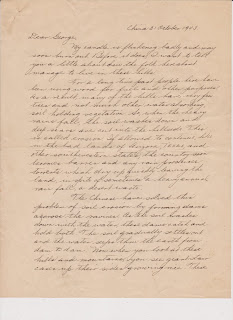After my grandfather served in China during WW2, he got a few months at home with his family then had to serve in Germany. He spent around 2 years in China, a couple months in the states then around 6 months in Germany before he could move his family there for the rest of his two year term there. Here is one of his letters from Germany.
1946 September 22
Sweetheart,
I've just signed my name to 100 vehicle license applications and have 100 more to go. Haven't written you for three days but haven't received any mail either. Have eight letters from you so far which gives me considerable reading material.
The night before last as I turned on the radio,, a baritone was singing part of La Bohem very beautifully in English.
Listen, sweetheart, all this talk about the luxury for army personnel here conceals the facts. In order to get a home, you have to dispossess the owner and several refugee families. Usually they must move into already overcrowded quarters. The home furnishing we use are theirs, taken from them because their country is now invaded by a conqueror. They are permitted to take their bedding, cooking, and mess equipment and sometimes their radio, In Berlin and other large cities, there were rich people. but here we have a small town with no really well-to-do folk. What rugs there are are badly worn and many items of needed furniture are missing. Before military government stepped in, U.S. personnel would loot homes for desirable items of furniture. That' why some few places have apparently luxurious furnishings. At the present time, the room in which I live has no dresser or chest of drawers and no table lamp. Light bulbs are very scarce and usually quite dull. As I said, we might be able to rent a piano. The inner spring mattresses they have here are all made in three sections and very uncomfortable. I do believe the experience will be good for all of us. You can't spend much money because there isn't anything to buy. However, when you travel, you spend plenty. Every foreign country is out to "soak" the American.
I opened the cello chest and found everything in good order. Because we now have a rainy season here, I thought it best to keep the instruments in my room where there is heat.
This letter isn't very full of love, is it, but my heart is. I've been reading a gook about Dr. Joseph Lister. He and his wife were deeply in love with each other and enjoyed a beautiful partnership.
Tomorrow, I may go to Bremen with Major Stuart, my chief associate. I'm anxious to learn my way about so I can help you find the commissary and other important places. Clothing here is rationed. I doubt if any but military clothing is avaiable.
The troops are going to give the children up to fifteen your of age something for Christmas besides candy from our rations. Gifts up to two dollars for the children will be very much appreciated, especially items of clothing. You see, they were rationed under HItler too, and that was some time ago.
Don't get impatient, Ginger, this is part of the cost of being in the army.
Did I tell you, we gets lots of rain here but the temperature doesn't fall as low as it does in southern Germany, largely because of the North Sea. I doesn't get as hot, either. That trench coat I bought is in use every day to keep me either dry or warm. It has already paid for itself.
Will you send me violin A and D strings. Better get a set for yourself too. If you can get the 220/110 v transformers, we'll be able to use our electric appliances too.
Love, hopes, and kisses, sweetheart.
George.



























